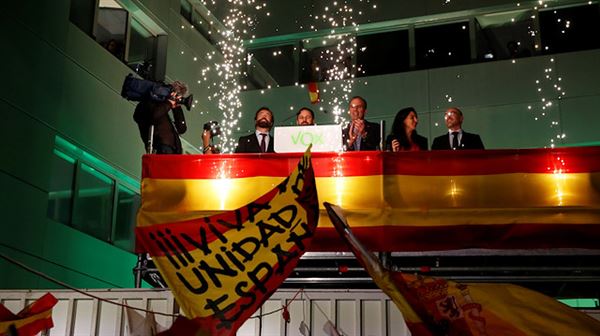Far-right Vox became the third-largest party in Spain's parliament in a national election on Sunday, winning 52 seats, up from 24 at its debut in Apri
Far-right Vox became the third-largest party in Spain’s parliament in a national election on Sunday, winning 52 seats, up from 24 at its debut in April.
The April election was the first time a far-right party won more than one seat since Spain returned to democracy in the 1970s.
NEWCOMER RISING FAST
Founded in 2013 by former members of the mainstream conservative People’s Party, Vox is anti-Muslim, nationalist, anti-feminist, Eurosceptic, socially conservative, economically liberal, and staunchly pro-Spanish unity.
It got its first foothold in office last December, winning 12 parliamentary seats in a regional election in Andalusia.
Vox is aligned with the broader populist movement that has also risen swiftly in other European countries, notably Austria, Denmark, France, Germany and Italy.
CATALONIA AND BEYOND
One of Vox’s founding aims was “recentralisation”: rewriting the constitution to abolish regional autonomy and parliaments, a theme that has struck a chord with many after a failed independence bid by Catalonia in 2017 and unrest in the northeast triggered by jail sentences for separatist leaders last month.
Positioning itself as vehemently anti-secessionist, it has berated the caretaker Socialist government for making deals with separatists to win their backing in parliament over the past year, and for failing to maintain order in Catalonia.
FRANCO AND “SPANISH REBIRTH”
Vox has also capitalised on its opposition to the recent exhumation of Fascist leader Francisco Franco – whose legacy still divides opinion 44 years after his death.
Vox’s rhetoric plays with notions of a Spanish “rebirth”, with party leader Santiago Abascal referencing founders of fascist ideology, and Francoist sympathisers have joined its ranks.
PACTS WITH MORE MODERATE RIGHT
Following April’s election, Vox struck pacts with the People’s Party and centre-right Ciudadanos to govern major municipalities, including Madrid or Murcia, loosely based on their first regional pact in Andalusia. A GAD3 poll showed Vox got more votes in Murcia than any other party.
Vox successfully lobbied to remove the former Madrid mayor’s signature programme – a low-emissions zone in the exceptionally polluted capital – from the governing pact.
Economically, Vox’s manifesto has been ultra-liberal: halving the highest income tax rate to 15%, reducing corporate tax, and abolishing wealth and inheritance taxes. It also proposes to partially privatise Spain’s pension system.
CAMPAIGN STAR
Several opinion polls identified Abascal as the winner of Monday’s final pre-election debate as he delivered parts of his campaign message – on immigration, Spanish unity and wasteful public spending – largely unchallenged by his four rivals.
Spain’s election board had blocked Vox from participating in debates before the April eletcion, so that Abascal was addressing such a large audience for the first time, as 8.2 million viewers tuned in.
Abascal, 43, is a career politician from the Basque country. Echoing U.S. President Donald Trump’s anti-immigration rhetoric, he has called for a wall to be built around the Spanish enclaves of Ceuta and Melilla and paid for by neighbouring Morocco.
“I am a supporter of discrimination,” he told 7TV Andalucia in 2017.
OTHER VOX PROPOSALS
* Intensify diplomatic efforts to return Gibraltar to Spain
* Repeal the law that bans Franco-era symbols and envisages compensation to dictatorship’s victims
* Ban medical procedures such as gender change and abortion under the public health system
* Repeal the law on gender violence
* Pass a law to protect bullfighting
* Deport illegal immigrants and any legal immigrants who commit a crime
* Shut “fundamentalist” mosques
